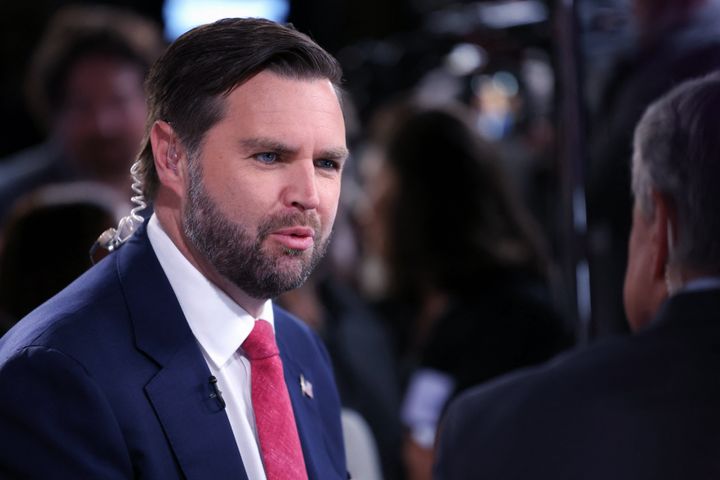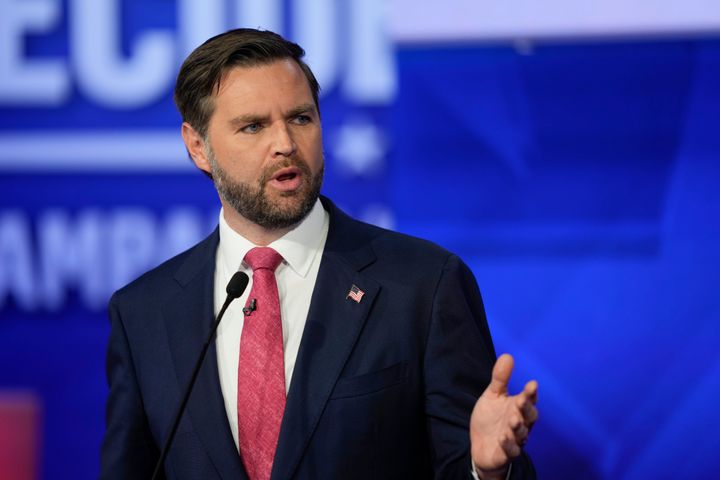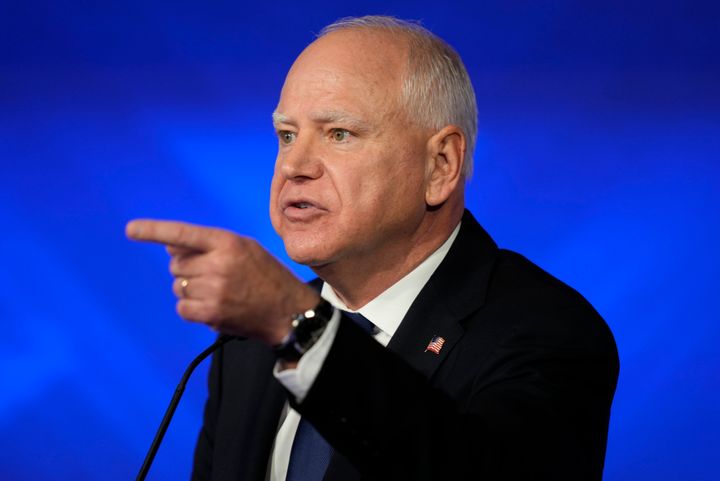Vice presidential debates are usually inconsequential undertakings between candidates for an office that has few defined responsibilities. But the debate between Republican Ohio Sen. JD Vance and Democratic Minnesota Gov. Tim Walz offered an answer to a question that has hovered over the country since Donald Trump won the White House in 2016: Is there a future for the politics Trump brought into the Republican Party after Trump himself is gone?
That question was put to rest by Vance’s performance in this debate. The first-term senator showed himself to be a smoother and more policy-focused version of Trump. He promoted himself as a populist supporter of the working class through tariffs, support for families and opposition to free trade deals while endorsing the ethno-nationalist agenda that has been the bread-and-butter of Trumpism. He did so without Trump’s seething rage, his divisive and racist language and his uncontrollable narcissism.
At the same time, he lied just as much as Trump.
He claimed that Trump brought back manufacturing jobs while the Biden administration has not. The opposite is true. He claimed he did not support a national abortion ban when he has previously endorsed one repeatedly. He said that Harris and President Joe Biden have hindered energy production by restricting fossil fuels when the U.S. is producing more oil than at any time in its history.
He lied about Trump having a plan to address child care costs. He claimed that Trump took bipartisan action to save the Affordable Care Act when the only vote in Congress that took place was Trump’s effort to repeal the law.
That’s just a short run-down. These lies were bold and blatant, but unlike Trump, Vance did not deliver them in a cartoonishly obvious way.

Vance also knew what version of himself to put forward. He did not display the callous persona visible on right-wing podcasts or at campaign rallies. And he did not, as Trump did, yell about Haitians “eating the cats” or “eating the dogs,” even though Vance was one of the most notorious promoters of the lie that Haitian immigrants in his own state were eating people’s pets.
It was a performance that showed a Republican can present as a MAGA true believer and still maintain self-control.
But there’s a flipside to presenting yourself as a more polished version of Trump.
‘A Damning Non-Answer’
A Republican trying to succeed Trump as his heir cannot avoid the one event that defines Trumpism more than anything: the insurrection he incited to remain in power on Jan. 6, 2021, after failing to concede that he’d lost the presidential election.
Vance dodged and deflected when asked whether he and Trump would accept the outcome of the 2024 election. He refused to talk about the insurrection and claimed that Trump peacefully handed off power on Jan. 20, 2021. And when Walz asked him to directly state whether Trump lost the 2020 election, he ducked.
“Did Donald Trump lose the 2020 election?” Walz asked.
“Tim, I’m focused on the future,” Vance replied.
“That’s a damning non-answer,” Walz shot back.
Vance has previously stated that if he had been in then-Vice President Mike Pence’s position, he would have done Trump’s bidding and helped him steal the election.
Harris’ campaign said Vance’s answer tested lower with swing voters than any other moment of the debate. A key test for Harris’ political operation will be whether they can make it the defining moment of the night ― and spread it, through ads and on social media, beyond the relatively limited live television audience for a vice presidential debate.
Minnesota Nice
Walz was nice. Too nice. Minnesota Nice.
There were moments where the Democratic candidate could have leapt to attack Vance and call out his lies, but chose not to. He barely touched on Vance’s racist attacks on the Haitian residents of Springfield, Ohio and completely missed an opportunity to hammer the Trump-Vance mass deportation plan. (Although that latter miss may be due to Democrats’ recent pivot rightward on immigration policy.)
At times, Walz seemed to be pleading with Vance, trying to convince the Republican candidate that he should step back from his support for Trump and choose a different path.

It felt as though Walz was playing it safe. He didn’t want to seem aggressive like Sen. Tim Kaine (D-Va.) did in 2016, when he interrupted Pence over 70 times. The version of Walz whose affable yet sharp and cutting appearances helped win him the VP nod only appeared occasionally.
“Gov. Walz is not prosecuting the case rather its a nicefest,” former Harris aide Symone Sanders Townsend posted on social media. “If you agree with Vance on so much then why should we vote for you?”
The only moment where Walz’s niceness really slipped came when Vance refused to answer Walz’s question on Jan. 6. Walz, red-in-the-face, lambasted Vance for his “revisionist history” and insisted Americans can’t forget what actually happened when Trump tried to steal the 2020 election.
Walz Found His Footing On Abortion
About halfway through the debate, Walz was given an opening with a question on an issue that Democrats see as a strength: abortion.
“After Roe v. Wade was overturned, you signed a bill into law that made Minnesota one of the least restrictive states in the nation when it comes to abortion,” asked moderator Norah O’Donnell. “Former President Trump said in the last debate that you believe abortion ‘in the ninth month’ is absolutely fine. Yes or no?
“That’s not what the bill says,” Walz scoffed, before pivoting to attack Trump, who has repeatedly taken credit for appointing the Supreme Court justices that overturned the national right to an abortion. He also pointed to Vance and Trump’s connection to Project 2025, a far-right policy plan.

Walz brought up a number of women from across the country who have become the faces of the potential consequences of anti-abortion policies: Amanda Zurawski of Texas, who suffered a near-fatal infection after being denied an abortion; Hadley Duvall of Kentucky, who was raped and impregnated as a child; and Amber Thurman of Georgia, who died after being denied treatment for an incomplete abortion.
“If you don’t know an Amanda or a Hadley, you soon will,” Walz said. “Their Project 2025 is going to have a registry of pregnancies. It’s going to make it more difficult, if not impossible, to get contraception and limit access, if not eliminate access, to infertility treatments.”
When Vance reasserted Trump’s position ― that abortion issues should be left to states — Walz pushed back.
“How can we as a nation say that your life and your rights — as basic as the right to control your own body — is determined on geography? There is a very real chance that if Amber Thurman lived in Minnesota, she would be alive today.”
Abortion is likely to be a major factor this year, the first presidential election since the conservative-majority Supreme Court overturned Roe. An increasing number of voters say the issue is central to their vote, and a significant majority say they trust Kamala Harris over Donald Trump.
Vance’s Too-Slick Answer on Health Care
If there was a moment where Vance tried to be too slick for his own good, it was when he claimed Trump — who very famously and publicly tried to repeal Obamacare and has very famously and publicly failed to produce an alternative health care plans despite years of promises otherwise — had “salvaged Obamacare” and acted in a “bipartisan manner” to do so.
The answer simply isn’t believable to anyone with even a passing knowledge of the health care politics of the past decade. And the answer is likely to only raise the salience of an issue the Harris campaign is clearly trying to inject into the news cycle, releasing multiple ads on the topic of health care this week alone.
Walz, citing his experience as an “old guy,” recounted what actually happened during Trump’s presidency: “He ran on, the first thing he was going to do on day one was to repeal Obamacare. On day one, he tried to sign an executive order to repeal the ACA. He signed onto a lawsuit to repeal the ACA, but lost at the Supreme Court. And he would have repealed the ACA had it not been for the courage of John McCain to save that bill.”
Vance insisted the GOP plan was to keep regulations protecting people with preexisting conditions in place, but simply “make the health insurance marketplace function a little bit better.” In other interviews, Vance has suggested plans that could, at the very least, dramatically drive up costs for people with pre-existing conditions.
Disclaimer: The copyright of this article belongs to the original author. Reposting this article is solely for the purpose of information dissemination and does not constitute any investment advice. If there is any infringement, please contact us immediately. We will make corrections or deletions as necessary. Thank you.
